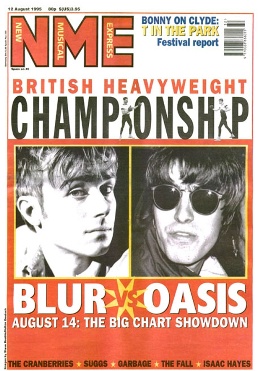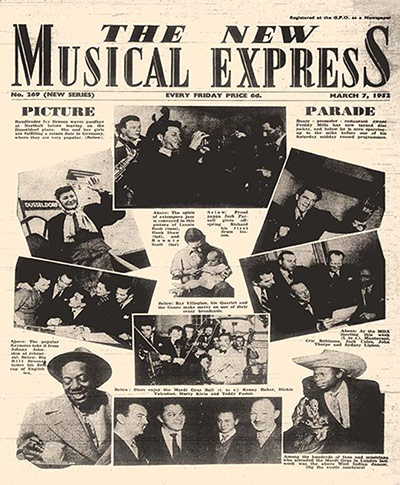NME first started in March 1952, as 'The New Musical Express'. It was known for being printed on newsprint instead of glossy paper which was the norm for magazines.
Similar to the the US magazine Billboard, in each issue it had the UK's weekly singles chart and was the first magazine to do so. The first No. 1 it had was "Here In My Heart" by Al Martino.
The magazine was very successful in the early 1960s under the editor Andy Gray, achieving 300,000+ figures during a 4 month period in 1964. Even during the psychedelic period of the late 1960s NME kept it's status as one of the UK's best selling music magazines.
 As the 1970s arrived the magazine wasn't selling as many with rival Melody Maker overtaking it, which almost led to it's closure by owners IPC Media. Alan Smith was then made editor and turned the magazine into a new cynical style hiring new writers. He gave the editorial role to Nick Logan as the magazine started selling almost 300,000 copies a week outselling all of it's rivals.
As the 1970s arrived the magazine wasn't selling as many with rival Melody Maker overtaking it, which almost led to it's closure by owners IPC Media. Alan Smith was then made editor and turned the magazine into a new cynical style hiring new writers. He gave the editorial role to Nick Logan as the magazine started selling almost 300,000 copies a week outselling all of it's rivals.Punk started to gain momentum in the late 1970s and this led to a more openly-political NME under Neil Spencer. The iconic logo which it still uses to this day in a modern form was brought in at this point.
The 1980s continued this trend, even having then Labour leader Neil Kinnock on the cover in 1985 and going as far as an interview with him in 1987. But hip-hop acts such as Public Enemy started to gain popularity with NME controversially covering them in the magazine leading to a rough patch of sales. Because of this decline Alan Lewis, who was a former editor of Sounds got brought in to save it. After a slow start this eventually proved to be a good decision and a commercial success.
Danny Kelly was made the new editor at the end of the 80s as Acid House and 'Madchester' both got popular.
 The early 1990s in NME had a large Alternative Rock influence from the USA with bands like Nirvana and Pearl Jam gaining much coverage. These and other American bands dominated the magazine over British ones, who still got some support. One noteworthy British band in this time is Manic Street Preachers who had a rivalry with the magazine. During this period artist Morrissey was featured on a lot of covers of the magazine, and eventually had a well-publicised dispute with the magazine after their allegations of racist lyrics in his music. He only eventually spoke to NME again in 1993 because the three writers involved then had left. When Steve Sutherland was made editor, a lot of the writers defected to sound and the British media started to be dominated by Britpop, two notable bands being Blur and Oasis. This was a new high for the paper who took part in publicising the chart battles, but as Britpop died so did the magazine's popularity going into the 21st century, with the late 1990s containing the magazine's ill-fated attempts of covering DJ's and trying politics again.
The early 1990s in NME had a large Alternative Rock influence from the USA with bands like Nirvana and Pearl Jam gaining much coverage. These and other American bands dominated the magazine over British ones, who still got some support. One noteworthy British band in this time is Manic Street Preachers who had a rivalry with the magazine. During this period artist Morrissey was featured on a lot of covers of the magazine, and eventually had a well-publicised dispute with the magazine after their allegations of racist lyrics in his music. He only eventually spoke to NME again in 1993 because the three writers involved then had left. When Steve Sutherland was made editor, a lot of the writers defected to sound and the British media started to be dominated by Britpop, two notable bands being Blur and Oasis. This was a new high for the paper who took part in publicising the chart battles, but as Britpop died so did the magazine's popularity going into the 21st century, with the late 1990s containing the magazine's ill-fated attempts of covering DJ's and trying politics again.Long rivals Melody Maker was merged with NME in the 2000s, and the new editor became Ben Knowles. Gone was the old newsprint style and a more conventional glossy and colourful paper has been used. It attempted to gain new audiences by covering artists of different genres like Jay-Z and Aphex Twin but yet again this was unpopular. They brought in a new editor in Conor McNicholas and started covering British indie bands like the Kaiser Chiefs. Popular band Arctic Monkeys then became the main band covered by the magazine in the early 2000s. The magazine was criticised for it's lack of diversity in 2008, and it got redesigned to be aimed at an older audience.
Despite this, the circulation for the magazine has been getting lower every year to the present day, with Mike Williams the current editor.
Even though it isn't selling as many copies and nowhere near as popular as it used to be, NME has still been a hugely influential magazine and the legacy of it during it's high points definitely overshadow the recent demise.

No comments:
Post a Comment